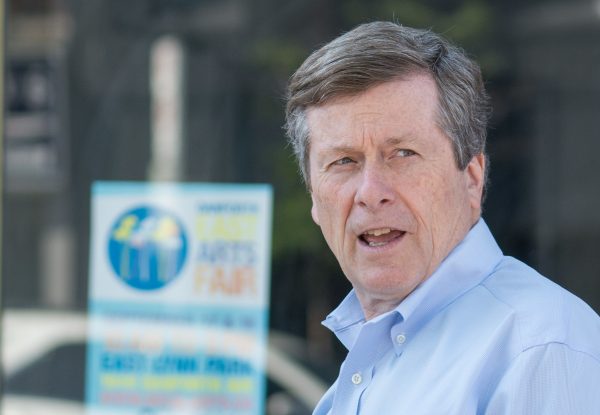Let’s not talk about candidates and the horse race, just for a fleeting moment.
The end of the John Tory era, which came to a screeching halt at about 8:40pm on Friday evening, is, of course, a calamity for the individuals involved. It’s a hot mess for a guy who promised to end the politics of hot messes.
The end of the John Tory era, however, marks a generational opportunity for Toronto council and the city in general to break away from the insidious incrementalism and tight-fistedness of the past twelve years and opt instead for a politics of far-sighted investment, inclusiveness, and genuine — as opposed to performative — fiscal probity.
I won’t bother fully enumerating the ways in which the Tory administration not only ran out of ideas but had become dangerously attached to a brand of politics that makes the right noises but simultaneously encourages division and a callous disregard for basic needs, and in particular housing and housing equity.
To my eye, the agenda for this council, with a new mayor, should read not like a rebuke to the stagnation of the Tory years, but rather as a way of genuinely confronting the problems that are afflicting the entire city, and will only accumulate in a crushingly costly way in the years to come.
The first step to sorting out the highly tangled issues begins with restoring the office of the mayor to its proper position as a driver of change as opposed to a broker of backroom compromises with the province.
Toronto desperately needs an outspoken mayor who is willing to use his or her bully pulpit to advocate for the solutions we need. That’s about creating and then occupying space in the political and public discourse for potentially ground-breaking shifts in direction; forcefully calling out the provincial government when its actions harm Torontonians (e.g., the sustained attacks by the Ford government on tenants and rental apartment buildings); leaning hard on council to get off the pot; and, finally, really pushing the civil service to deliver on the promises made by council in the form of policy directives.
Second, and relevant to the current budget debates, the next mayor needs to make a strong case to the residents that articulates not only why the current fiscal arrangements are unsustainable, but lays out a compelling strategy for overcoming them. This move will include political pain, in the form of higher taxes and fees, but it also requires the next mayor to take full advantage of the revenue generating powers in the City of Toronto Act. Begging the upper orders for money won’t ever work if the mayor and council aren’t prepared to spend political capital.
Third, and following from point two, the new mayor needs to engage in a sustained conversation with the residents of the city that clearly links structural under-funding to the failings in municipal government that are obvious to everyone. There can be no ambiguity or double-talk about this component of a reform agenda.
Fourth, we need a mayor who can connect the dots. There’s a stunning chart in the Shelter, Support and Housing budget memo showing the hockey-stick growth in shelter demand in the past year [editor’s note: link has been updated since originally published). This surge is about the housing crisis, and all the planning reforms now in play don’t address the spike.
The city next year will spend almost $300 million on shelter operations that provide beds for about 9,000 people per night, and this figure doesn’t include all the money that’s been spent on the cruel sport of uprooting encampments. Since Tory was elected in 2014, council has spent about $2 billion — a staggering sum — running the shelter system. However, in the past two years, with assists from the federal and provincial governments, the city brought on stream 250 permanent supportive housing units in modular projects for less than $50 million.
The shelter system is radically unsustainable, and the solution is not to keep pouring money into it or harassing people who have been thrown on to the streets for all sorts of reason, but rather to sharply accelerate and expand the construction of low-cost, permanent, supportive housing. To get there, however, the mayor must take the lead, explain clearly why the status quo has essentially seized up, and charge ahead with what is clearly a viable alternative.
Fifth, the next mayor needs to make a forceful argument for public amenities and community investment in areas that are seeing or will see high density development in the years to come. In particular, s/he should tell the province in no uncertain terms to scrap the highly dubious Ontario Place re-development and use the space for much needed park space, uproot antiquated regulations that police public space, and rebuild the public realm.
Finally, Toronto council needs to wake up to the fiscal reality that the Gardiner re-build is not just an absurd project in the era of climate crisis, but also a ticking fiscal time-bomb, and one that is destroying the city’s ability to make long-term capital investments in the years to come.
By scrapping this ridiculous project and introducing new revenue sources, the city could spend half those Gardiner dollars on a massive investment in new buses to sharply improve service on busy trunk lines, and perhaps halt the vicious cycle we’re now seeing with transit use in Toronto. And it could allocate the balance on a much-needed expansion of permanent supportive or ultra-low-cost housing — a move that will, in the long-run, help reduce the ever-increasing amount we spend on shelters each year and thus protect residents from the associated tax hikes.
Tory’s exit paves the way for a new form of politics in Toronto. It is a gift, and we need to seize the moment.






2 comments
Hi, just wanted to note that the article links to an older SSHA budget note. For the current budget note with the “stunning chart”, readers should go to https://www.toronto.ca/legdocs/mmis/2023/bu/bgrd/backgroundfile-230766.pdf.
^^ Thank you, Heath — link has been updated.